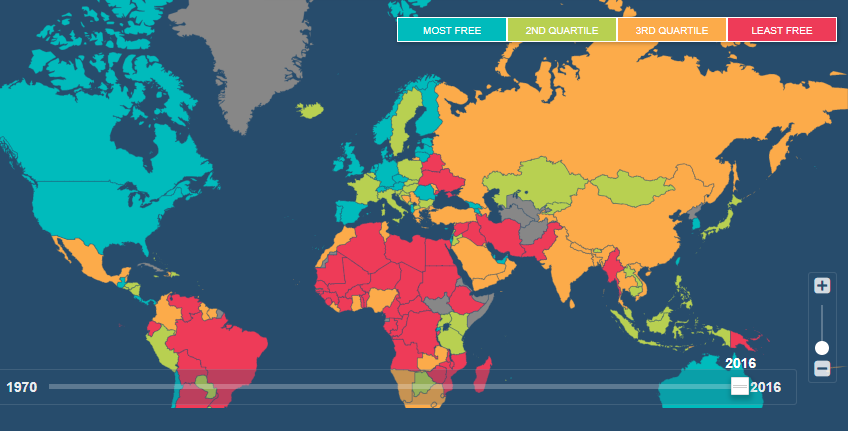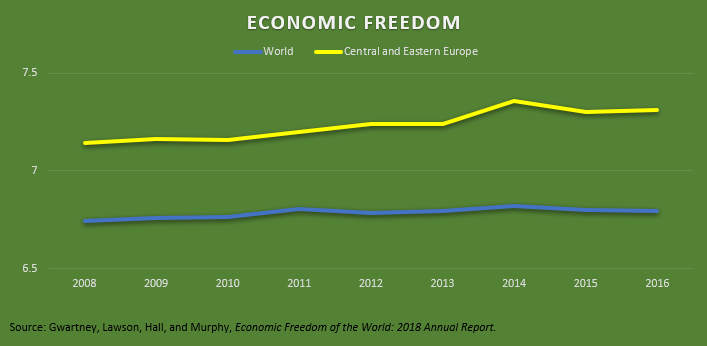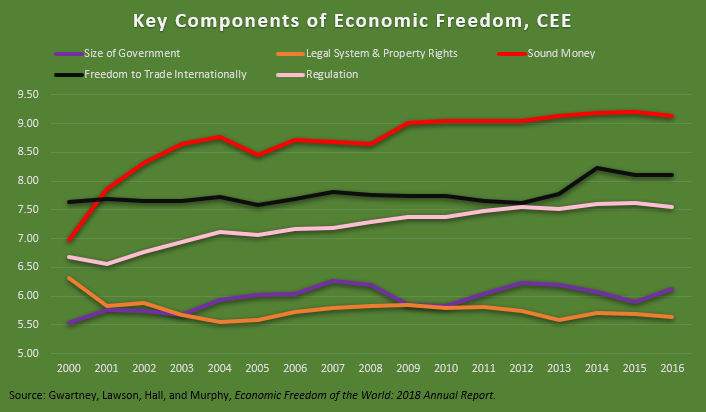Last week, the Economic Freedom of the World: 2018 Annual Report was released. The report is based on data from 2016 (the most recent year of available comparable data) and measures the economic freedom (levels of personal choice, ability to enter markets, security of privately owned property, rule of law, etc.) by analyzing the policies and institutions of 162 countries and territories.
Hong Kong and Singapore again top the index, continuing their streak as 1st and 2nd respectively. New Zealand, Switzerland, Ireland, the United States, Georgia, Mauritius, the United Kingdom, Australia, and Canada (tied for 10th) round out the top 10.
Other notable countries include Germany (20th), Japan (41st), France (57th), Russia (87th), and China (108th).
Countries in Central and Eastern Europe (CEE) rank as follows: Estonia and Lithuania (tied for 13th), Romania (20), Latvia (23), the Czech Republic (30), Albania (34), Bulgaria (46), Slovak Rep. (53), Poland (54), Hungary (59), Macedonia (68), Slovenia (71), Montenegro (72), Croatia (75), Serbia (84), and Bosnia and Herzegovina (98).
The 10 lowest-ranked countries are Sudan, Guinea-Bissau, Angola, Central African Republic, Republic of Congo, Syria, Algeria, Argentina, Libya, and last-place Venezuela.
Some despotic countries such as North Korea and Cuba could not be ranked due to lack of data.
Figure 1 presents the level of economic freedom from 2000 to 2016, with economic freedom improving in the world from 6.74 in 2008 to 6.80 in 2016 and improving in Central and Eastern Europe (CEE) from 7.14 in 2008 to 7.31 in 2016.
Figure 1: Economic Freedom
Central and Eastern Europe (CEE) scores in key components of economic freedom (from 1 to 10, where a higher value indicates a higher level of economic freedom) are as follows:
-
Size of government: changed to 6.12 from 5.90 in the last year’s report;
-
Legal system and property rights: changed to 5.64 from 5.69;
-
Access to sound money: changed to 9.13 from 9.20;
-
Freedom to trade internationally: changed to 8.11 from 8.10;
-
Regulation of credit, labor and business: changed to 7.56 from 7.62.
Figure 2 shows the change in key components of economic freedom for Central and Eastern Europe (CEE) scores since 2000.
Figure 2: Key components of economic freedom for Central and Eastern Europe (CEE)
The annual Economic Freedom of the World report is produced by the Fraser Institute in cooperation with the Economic Freedom Network, a group of independent research and educational institutes in nearly 100 countries and territories.
See the full report at www.fraserinstitute.org/economic-freedom





